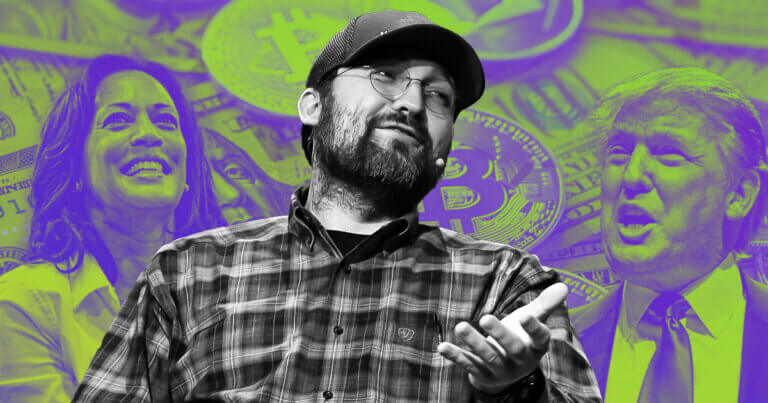 Cardano founder Hoskinson warns Trump’s DeFi venture could spark political backlash
Cardano founder Hoskinson warns Trump’s DeFi venture could spark political backlash Cardano founder Hoskinson warns Trump’s DeFi venture could spark political backlash
Hoskinson also expressed doubt about both presidential candidates' policies for the crypto industry, but acknowledged Trump's comparatively pro-crypto stance.

Cover art/illustration via CryptoSlate. Image includes combined content which may include AI-generated content.
Cardano and Ethereum co-founder Charles Hoskinson expressed doubts about the crypto policies of both former President Donald Trump and Vice President Kamala Harris in recent interviews with mainstream news.
In an interview with The Financial Times, Hoskinson voiced concerns that neither Trump nor Harris has demonstrated a clear path forward for the crypto sector in the US, despite the former’s more progressive stance toward the industry.
He told the newspaper:
“I don’t see that level of quality and sophistication in the discourse.”
Hoskinson criticized Harris, suggesting her approach would likely continue the policies of the Biden administration, which he described as detrimental to the industry.
Meanwhile, he expressed doubt that Trump could assemble a team capable of advancing the crypto industry, citing the former president’s history of high staff turnover.
He also noted a generational divide within the Democratic Party regarding digital assets, compared to Republicans, who seem to be more open to the idea of fair regulations, citing Senator Cynthia Lummis and her efforts for the industry.
Hoskinson highlighted that while senior leaders, such as Elizabeth Warren and President Joe Biden, have shown reluctance toward the industry, younger Democrats, including Ro Khanna, are more open to discussing fair regulatory measures. He anticipates that over time, the party’s stance on crypto regulation will likely evolve.
Trump’s pro-crypto stance and partisan risks
Meanwhile, during an interview with CNBC, Hoskinson was optimistic about Trump’s stance on crypto despite his reservations. He said that Trump and his family’s involvement in DeFi projects and his talks at crypto conferences have positioned him as the “more pro-crypto” candidate.
He said:
“Trump is certainly the favorite from a cryptocurrency perspective.”
Hoskinson also noted that while Trump’s approach may appear opportunistic, such behavior is common in American politics, and “every politician has some degree of opportunism.” He added that a broad coalition is necessary to enact lasting change for the industry.
Hoskinson further cautioned that Trump’s new DeFi platform, World Liberty Financial, could become a partisan issue. He said that the former President’s past actions have often sparked strong reactions from his political opponents, and this venture might be no different.
He said:
“Trump is launching a DeFi application, and that’s scary to me as an industry because everything Trump does the left hates with such a passion.”
He emphasized that the venture risks politicizing an otherwise bipartisan space, adding that Democrats may retaliate by using government institutions such as the Department of Justice or the Securities and Exchange Commission (SEC) to hinder the project.
He raised concerns that such regulatory actions could have wider implications for the crypto industry as a whole, potentially driving more of it off-shore.
Regulatory clarity
In the broader context, Hoskinson emphasized that global cryptocurrency adoption is already advancing and will persist regardless of US involvement. He stressed the importance of regulatory clarity and a supportive political landscape to foster the industry within American borders.
He said that if the US establishes a clear regulatory regime for the industry, it could potentially add between “$5 trillion and $10 trillion” in value to its economy over the next decade by embracing decentralized technologies and creating more equitable systems.
He pointed to progressive regulatory developments in regions such as Singapore, the Middle East, and Europe as key examples of how other nations are moving forward with crypto-friendly policies.
Hoskinson expressed a desire for the US to re-enter the race and take a leading role but remains uncertain whether the political landscape will align with the global movement toward decentralization.
Mentioned in this article
 Cardano
Cardano  Ethereum
Ethereum  Donald Trump
Donald Trump  Kamala Harris
Kamala Harris  Charles Hoskinson
Charles Hoskinson  Elizabeth Warren
Elizabeth Warren  Cynthia Lummis
Cynthia Lummis  Joe Biden
Joe Biden 




 Deribit
Deribit 























































































